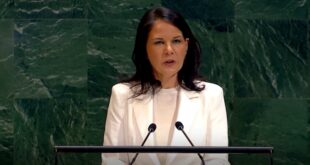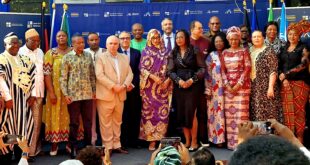“The morning of 7 November 2020 has shown the world that America’s long nightmare is finally over and better angels of our nature have prevailed,” writes David Monda* from New York. He analyses how the incoming Joe Biden’s administration will most likely interact with Africa, especially in the areas of economic relations and promotion of democracy.
—–
The lesser angels of human nature seemed to have dominated the matrix of American politics for the past four years. As a result, the global community waited with great interest for the results of the last US election. Africa was not left out of the suspense. However, what does Joe Biden’s win mean for Africa?
Biden’s win means that multilateralism is the new game in town. Trump focused on unilateralism – America First.
While Biden and Trump both look to advance American interests in dealing with Africa, they opt for different methods in pursuing those vital interests.
The US is looking to expand its economic footprint on the continent to check the advances of the Chinese and Russians in Africa. Biden will emphasize multilateralism.
The Trump Administration has preferred unilateral pursuit of American national interests through bilateral trade negotiations with individual countries on the continent.
Ironically, individual countries on the continent gained great traction with the Trump administration. Morocco, for instance, already has a free trade agreement with the United States and looked to deepen this even further.
Kenya, on the other hand, benefits from the ongoing bilateral Free Trade Agreement (FTA) negotiations with the United States. In addition to this, during the Trump administration, Kenya launched the first direct flights between Nairobi and New York. The USA is the number one source market for tourists to Kenya.
The irony in Trump’s departure is that policy makers are not sure how the new administration will approach these negotiations. Critics of this bilateral diplomacy of the US with individual African nations have pointed out how it undermines continental trade agreements like the Africa Continental Free Trade Area (AfCFTA).
Secondly, Biden’s win means a focus on democratic governance in Africa. This is something to keep in mind because of the fact that Africa has witnessed several disputed elections in Guinea, Ivory Coast and Tanzania in 2020. It is due for more elections in 2021 in Uganda and 2022 in Kenya.
Washington will be looking to use quiet diplomacy to coerce the leaders of Guinea, Ivory Coast and Tanzania to expand the democratic space for the opposition and allow for more transparency for future elections.
Lastly, the Biden Administration will make human rights one of the core pillars of its foreign policy in Africa.
President-elect Joe Biden has close to half a century of experience on the Senate Foreign Relations Committee. Biden will look to hold human rights abusing governments on the continent to account for their actions. How might this emphasis on human rights affect Africa specifically?
The Biden Administration can opt to use the International Criminal Court (ICC) at the Hague as a means to try politicians suspected of being behind electoral violence, repression and crimes against humanity. Already, the sitting Kenyan President Uhuru Kenyatta and his Deputy William Ruto have faced crimes against humanity charges at the ICC. Other African leaders that have faced the wrath of the court include former Liberian president Charles Taylor and a high ranking official of the former Rwandese government Felicien Kabuga. Former President of Sudan Omar Al Bashir has also been indicted by the ICC. Al Bashir is of particular interest to the US for his support for terror groups attacking American interests in the region.
Large states have power, but equally, smaller states have agency. When their interests are in concert, things happen.
Biden’s foreign policy towards Africa will continue to evolve over the next four years and only time will show it all plays out.
—–
Prof Monda teaches political science, international relations and American government at the City University of New York (York College), New York, USA. He can be reached at: dmonda1@york.cuny.edu
 THE AFRICAN COURIER. Reporting Africa and its Diaspora! The African Courier is an international magazine published in Germany to report on Africa and the Diaspora African experience. The first issue of the bimonthly magazine appeared on the newsstands on 15 February 1998. The African Courier is a communication forum for European-African political, economic and cultural exchanges, and a voice for Africa in Europe.
THE AFRICAN COURIER. Reporting Africa and its Diaspora! The African Courier is an international magazine published in Germany to report on Africa and the Diaspora African experience. The first issue of the bimonthly magazine appeared on the newsstands on 15 February 1998. The African Courier is a communication forum for European-African political, economic and cultural exchanges, and a voice for Africa in Europe.
























